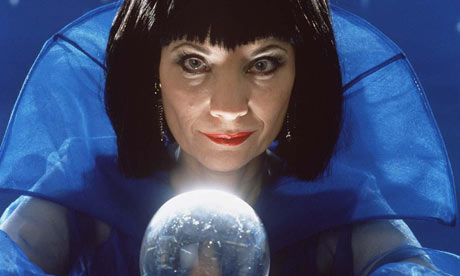
Yesterday morning a friend of mine – let's call her Hannah – emailed to apologise for making me redundant as her favoured source of book recommendations. Beneath that stark notice of termination stood a link: www.bookseer.com. Hackles already up, I clicked through to a screen that asked me the title and author of the last book I'd read.
"The Illustrated Man", I typed, and "Ray Bradbury". In the wink of a modem I was furnished with a list of recommendations from both Amazon and LibraryThing. On the Amazon list, understandably enough, there were a few other Bradbury titles mentioned – Dandelion Wine, The Martian Chronicles – as well as Philip K Dick's Do Androids Dream of Electric Sheep? Also Watchmen, which I thought was a rather good and not entirely obvious suggestion.
The logic behind LibraryThing's recommendations, however, was less discernible. Would Kim Stanley Robinson's Martian cycle get a mention? How about Vonnegut's Slaughterhouse-Five, which shares Bradbury's interest in commingling the horrific, the fantastic and the imperfectly human? Nope: Wuthering Heights. Quite madly, the rest of the list comprised Jane Austen novels and "saucy" rip-offs of the same.
Book Seer, it seems, gets a little lost in Austen's case. Type in "Pride and Prejudice" and LibraryThing sensibly, if conservatively, suggests other works by the author. The Amazon list, though, wonders if you wouldn't like to proceed from Pemberley to Sweden by way of the vampire novel Let the Right One In, or to the post-apocalyptic America of Cormac McCarthy's The Road (I don't harbour a huge amount of love for Hertfordshire, but that does seem a little harsh), or … hmmm, the inclusion of Watchmen doesn't seem quite so impressive this time.
It would be wrong, however, to aim too poisoned an arrow at what is an entertaining application. A little digging reveals that Book Seer isn't, as might have been expected, an affiliate marketing program for Amazon, but a harmless enough publicity-getting project launched earlier this month by a design and marketing company. Winningly, Book Seer also suggests you visit your local bookshop or library, and includes links to directories of both. It has posted some data relating to searches carried out so far here, which you can parse at your leisure. The dominance of Stephenie Meyer and JK Rowling seems predictable enough at first glance, but less so when you consider Book Seer's function: don't most readers of Meyer and Rowling just read more Meyer and Rowling?
Fun as it is to hunt down the anomalies – try as I might, short of both having been filmed I can't see the link between The Da Vinci Code and Notes On a Scandal – Book Seer prompts a question above and beyond the functionality of its algorithms. Namely: what methods do most people actually employ to move from one book to another? Is it the "if you liked this, try this" suggestions of online retailers such as Amazon? Or perhaps newspaper and journal reviews, a bookseller's expertise, serendipitous browsing or the opinion of friends? Could it even be, flying in the face of the maxim, a book's cover?
For most people, I suspect, the answer is likely to be a combination of all the above. My friend Hannah's change of heart notwithstanding, it's hard to beat the recommendation of someone you know and whose opinion you trust. Adding to the appeal of this method, you know you'll have someone with whom you can discuss the book once you've finished it. That said, there's a deep satisfaction to be had in burying yourself in a bookshop's shelves and emerging with a new discovery.
Which leads to a further question: when you've finished a book, do you really want to read something similar? I know there are people who only read crime novels, or biographies, or who erroneously think life long enough to accommodate both Paulo Coelho's The Alchemist and Richard Bach's Jonathan Livingston Seagull, but aren't the best recommendations those that are alive to more tangential connections between books? Perhaps those glitches that Book Seer suffers are in fact its greatest asset: providential opportunities to widen ones scope. Maybe it really would be good to read Asimov's The Rest of the Robots straight after Donald Barthelme's 60 Stories, or follow Browning's The Ring and the Book with Jenny Uglow's Life of Thomas Bewick, or Martin Amis's Koba the Dread with, well, with a period of not reading anything at all for a bit.
So tell me: which method do you favour to carry you from one book to the next? And while we're at it, what are the most seemingly inappropriate or weirdly, unexpectedly apposite recommendations you can wring from Book Seer?

